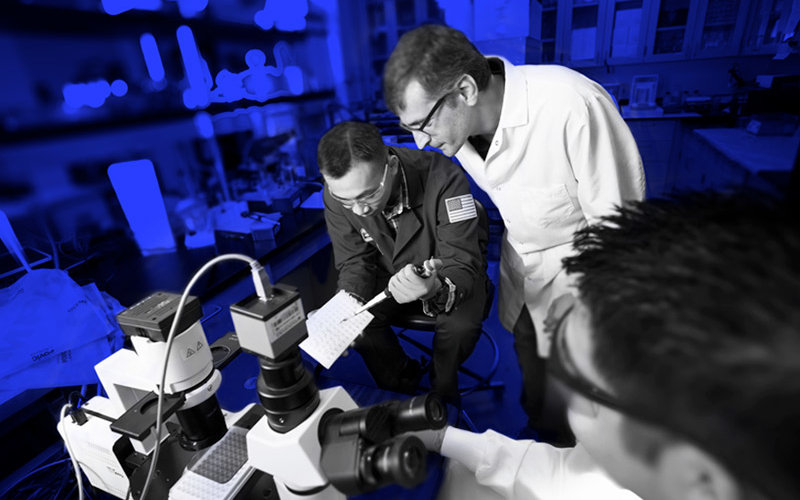
In everyday life, people are bombarded by stressful factors from the environment: radiation from the sun, a fever caused by viral infections or carcinogens that cause cancer.
“Without intervention, these factors can disrupt cellular processes, and eventually lead to a host of different diseases,” said Ryan Oliverio, who earned his master’s degree in biology this year.
Under the mentorship of Cal State Fullerton molecular biologist Nikolas Nikolaidis, Oliverio and fellow student researchers are investigating a particular molecule found in stressed cells known as “heat shock protein.” Their research focuses on finding out how these cells respond to environmental stress due to heat, toxins and even cancer.
“This heat shock protein plays a critical role in the ability of our cells to resist, adapt and survive stress,” explained Nikolaidis, associate professor of biological science. “However, this particular protein can be a friend or a foe. It can help you recover from a fever, but it can also help to keep cancer cells alive.”
Using bioinformatics tools and biochemical experiments, the researchers discovered how these crucial abilities of this heat shock protein were retained in humans.
“Our findings reveal the genetic mechanisms and evolutionary forces that preserve one of the most critical components of our ability to survive stress — and thrive,” continued Nikolaidis, who was awarded a $417,300 National Institutes of Health grant last year for his research.
This breakthrough by Nikolaidis and his team of student researchers was published in Scientific Reports, an online multidisciplinary, open access journal from the publishers of Nature. In addition to Nikolaidis, the paper includes seven CSUF student co-authors and Dimitra Chalkia, a biostatistician and visiting scientist last year in Nikolaidis’ lab from the UCLA Center for Systems Biomedicine.
Oliverio, one of the paper’s student co-authors, became interested in the research to learn more about the biological mechanisms behind conditions such as Alzheimer’s disease, which afflicts his grandparents.
“By understanding why we have so many stress-related proteins and how genetic variation, both natural and clinical, affect the function of these proteins will help us learn more about genetic predispositions to a wide variety of diseases, the role cellular stress proteins play on these diseases, and the importance of cellular stress proteins for an organism,” said Oliverio, who starts osteopathic medical school in the fall at Touro University Nevada to pursue a career in family medicine.
Kyle Hess, another student co-author, was drawn to the research because of his interest in human evolution.
“I like the idea of combining computational research with experimental biology to understand more about our history as a species,” said Hess, who earned his bachelor’s degree in biological science in 2016 and is a doctoral candidate in molecular and cellular biology at the University of Washington.
“Before our project, no one had systematically looked at how this heat shock protein has changed within the human population.
“Heat shock proteins are crucial for human survival. By uncovering the evolutionary history of these proteins in humans, we are able to better understand how they may shape both human health and disease in modern times. This type of information may help future scientists and clinicians delineate the complex relationships between heat shock proteins, human health and disease.”
Peter Nguyen, who earned his bachelor’s degree in biological science in 2015, began doing research in Nikolaidis’ lab six years ago as an undergraduate.
“Through our research, we can potentially prolong the survival of our human race,” said Nguyen, also a co-author of the paper who is on track to earn his master’s degree in biology next year. He plans to pursue a research career in the U.S. Army, focusing on limb regeneration.
“I hope that one day I will be able to use my knowledge and experience to combat against the diseases that contribute to the failure of cellular stress,” Nguyen added.